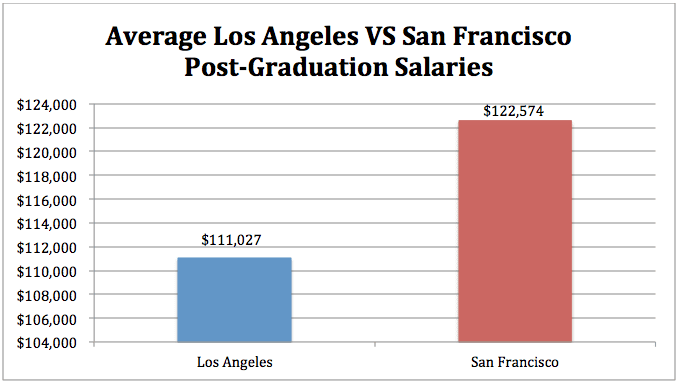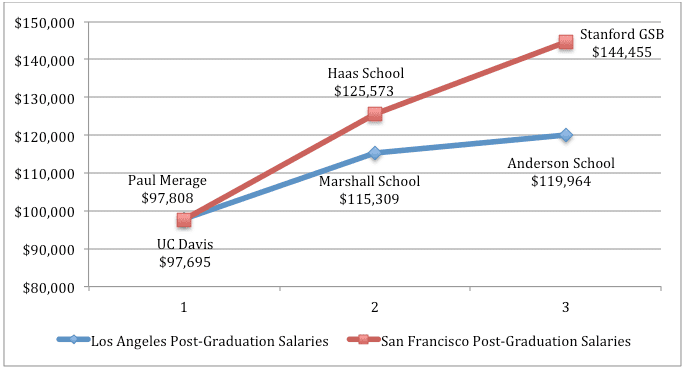The Perfect MBA Career: Portfolio Manager

If working in investment strategy seems appealing, then a job as a portfolio manager may be right for you.
What is Dell Looking for When it Comes to MBA Talent?

When considering jobs and internships, MBAs may reflect on the diverse set of skills and experience they’ve acquired. And few industries are witnessing a greater reflection of those diverse skills than tech.
Dell Technologies is one organization that has demonstrated a major commitment to hiring MBAs for their fresh knowledge and ideas, as evident in its 2020 ‘Legacy of Good’ Plan.
Wharton Economist, Berkeley Alum Ann Harrison Named New Haas Dean

Ann Harrison, a renowned economist and member of the faculty at the University of Pennsylvania’s Wharton School, has been named the next dean of the UC Berkeley Haas School of Business. Harrison earned her undergraduate degree from Berkeley and served as a professor in Berkeley’s Department of Agricultural and Resource Economics from 2001 to 2011.
“Professor Harrison is an accomplished administrator as well as a world-class economist who has dedicated her career to creating forward-looking policies in development economics, international trade, and global labor markets,” Berkeley Chancellor Carol Christ said in a statement announcing the appointment. “It is a great honor to welcome her back to Berkeley to become the dean of Haas, and I have no doubt that she will be a wonderful leader the institution.”
Harrison, who will begin her term on January 1, 2019, said she is thrilled to return to Berkeley and looks forward to meeting Haas students and alumni and working with its distinguished faculty and staff, according to the release from the school.
Harrison worked as director of development policy at the World Bank before joining the Wharton faculty in 2012, co-managing a team of 300 researchers and staff. In her time with the World Bank, she reformed its research fund allocation process and supervised its most important publications, including the annual World Development Report. Setting a milestone in transparency for the institution, she convinced the World Bank’s president to release all historical records on project loans.

Ann Harrison named new Haas dean
“Ann has a remarkable track record of pioneering research on trade and development, including influential studies of globalization’s effects on jobs and inequality,” Berkeley Economics Professor Maurice Obstfeld said in a statement. Obstfeld serves as chief economist at the International Monetary Fund and was a colleague of Harrison’s when she worked in Berkeley’s Agricultural and Resource Economics Department.
Princeton Professor Emeritus Sir Angus Deaton, who has known Harrison since her days as a graduate student at Princeton, praised her appointment. “Based on Ann’s experience at the World Bank, she will be an effective and much-loved manager,” said Deaton, who also holds the 2015 Nobel Laureate in Economic Sciences for his analysis of consumption, poverty, and welfare.
In addition to a Ph.D. in economics from Princeton, Harrison also holds a diplôme d’études universitaires générales from the University of Paris and is a research associate at the National Bureau of Economic Research and a member of the United Nations Committee for Development Policy. Author and editor of three books—including Globalization and Poverty and The Factory-Free Economy—Harrison is one of the most highly cited scholars globally on foreign investment and multinational firms.
Harrison replaces outgoing Dean Rich Lyons, who stepped down in June 2018 after serving as Haas dean for the past 11 years. He plans to return to teaching at Haas after completing a sabbatical. Haas Professor Laura Tyson, who has served as interim dean since Lyons’ departure, will remain in the role until January, 2019.
This article has been edited and published with permissions from our sister site, Clear Admit.
10 Highest GPA Averages in the Business School World

The role of a GPA in MBA admissions is a hotly debated topic among both admissions officers and applicants. How much does it really matter? Does a low GPA destroy your chances of getting into a top business school?
One of the most important things to keep in mind when considering how your undergraduate GPA will impact the MBA admissions process is the fact that not all GPAs are alike. Far from a standardized figure, GPA and the way it’s measured can vary from school to school- even major to major. For this reason, it can be difficult to use the GPA’s of different applicants as any accurate predictor of success.
An student’s GPA will always be an important part of the admissions process, because it helps tell admissions officers about past academic success. Still, admissions officers are well aware of the high level of variability between GPA scores. Taking this into account, most officers working in MBA admissions will always look for more to an individual’s story than just the GPA. Numbers like a GMAT/GRE can often paint a much more exact picture of future academic success than the highly variable GPA. Designed for standardization and to test individuals on the specific challenges of an MBA, a GMAT score allows admissions officials specific insight into each application.
When considering GPA, a general rule of thumb is to not ride or die by this number—whether for better or for worse. A low undergraduate GPA doesn’t necessarily spell disaster for one’s MBA ambitions, and even a perfect 4.0 can’t save an application if the other factors don’t add up.
Overall, the exact number of an undergraduate GPA may be less important than the story behind it. If your low GPA was a result of illness or another external factor while in school, personal statements on the application are a great opportunity to give context behind the numbers and help tell your story to admissions officials.
YOU MAY ALSO LIKE: The Highest Paying MBA Internships You Can Find
Nevertheless, getting a sense of the average undergraduate GPA for your prospective programs can help give provide crucial insights. Class profiles and statistics for business schools throughout the country can give prospective students a good sense of the typical student looks like in each program, and help applicants decide if they’ll be a good fit.
Below, we take a look at the top 10 MBA programs with the highest average undergrad GPA. Take a closer look at these top schools to get an idea of the average student in each program- and your potential future classmates.
10 Highest GPA Averages for MBAs
1. Stanford University Graduate School of Business
The highest GPA average for MBA students in the U.S. belongs to the class at the Stanford University Graduate School of Business. For the Class of 2019, the average undergrad GPA was 3.74. This is down slightly from the school’s 2015 average of 3.75.
2. Harvard Business School
Often jockeying for position with Stanford, HBS took the number two spot this year with an average undergrad GPA score of 3.71. Three years ago, HBS still loomed large with a 3.66 average, and it just keeps getting higher.
3. Haas School of Business – UC Berkeley
Staying on the heels of Harvard, the Haas School of Business at UC Berkeley takes a top spot today with an undergraduate GPA of 3.7. This is a slight increase from the school’s 2015 average of 3.66.
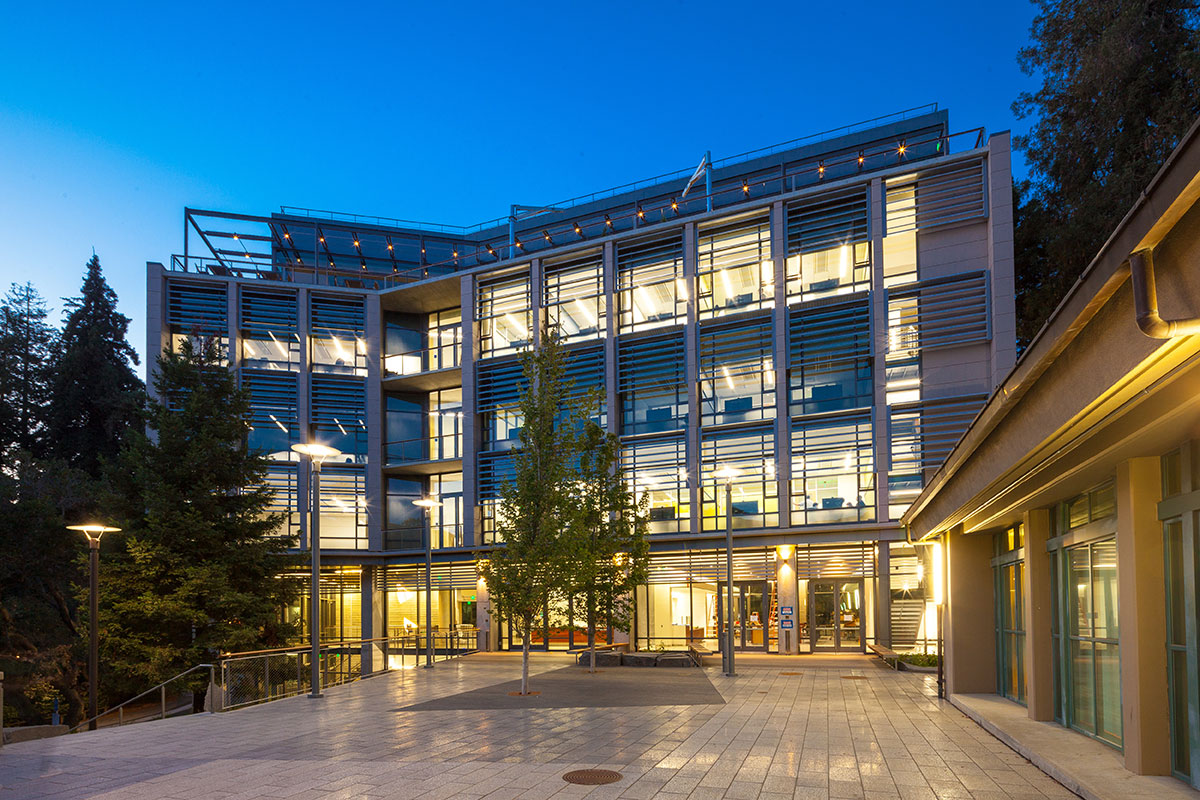
The Haas School of Business GPA average for MBA applicants rose from 3.66 to 3.7 since 2015.
4. Yale School of Management
Significantly up from its GPA average of 3.6 in 2015, the Yale School of Management today has one of the highest undergraduate GPAs in the country at an average of 3.69.
5. Booth School of Business – University of Chicago
The MBA at University of Chicago’s Booth School of Business has consistently maintained one of the top GPA averages for programs in the U.S., up from 3.59 in 2015 to 3.6 this year.
6. The Wharton School – University of Pennsylvania
The Wharton School, consistently recognized for having some of the country’s top business programs, is nothing if not consistent. With a 3.6 average for incoming students between 2012 and 2015, Wharton maintains a perfect 3.6 average GPA this year as well.
7. Kellogg School of Management – Northwestern University
Northwestern’s Kellogg School of Management is another school where consistency is key. From 2014 to today the school has remained at an undergraduate GPA average of 3.6
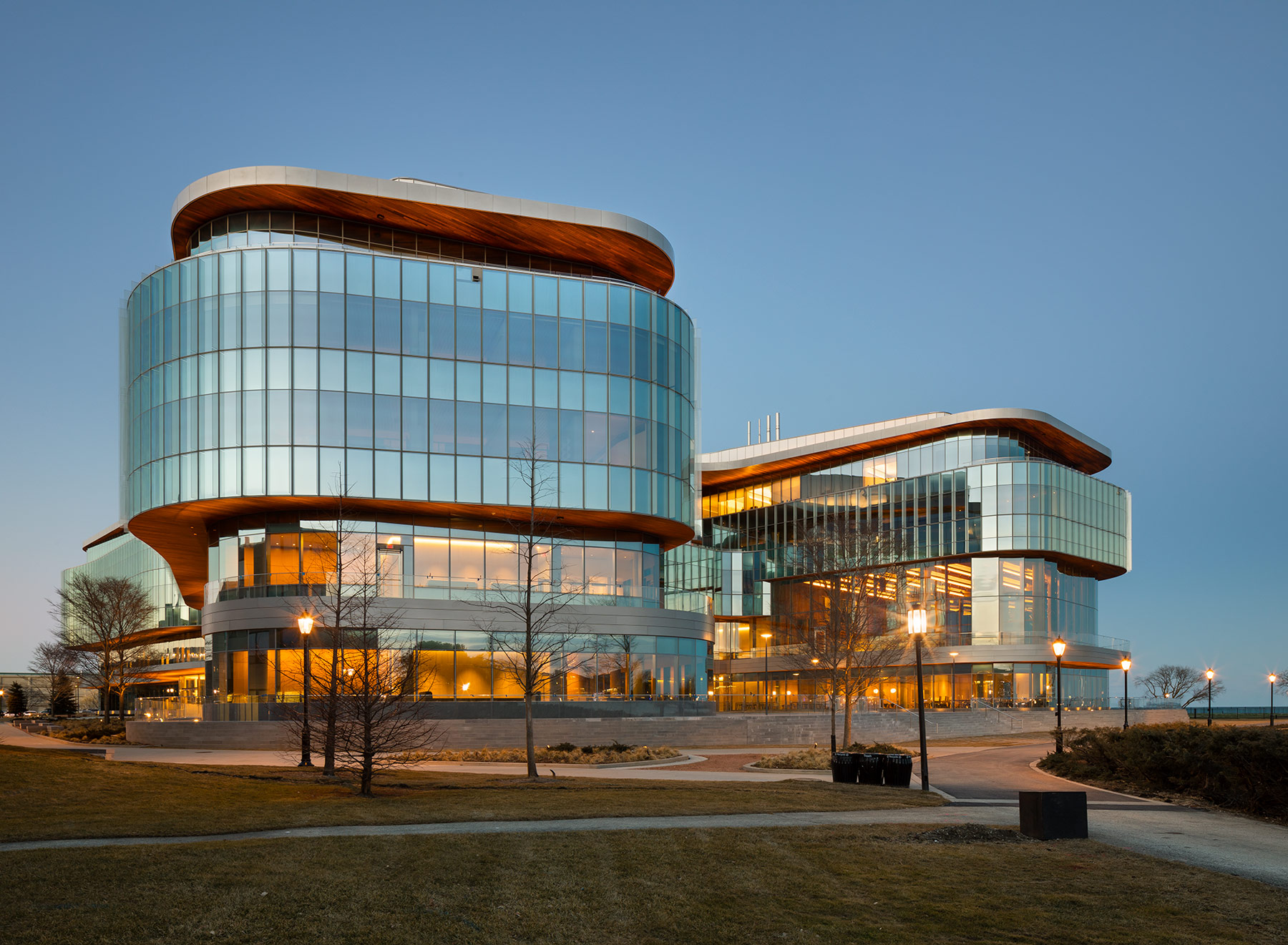
The average Kellogg undergraduate GPA for MBA students has stayed at 3.6 since 2014.
8. Tuck School of Business – Dartmouth College
The average GPA for incoming students at Dartmouth’s Tuck School of Business has gone up and down throughout the years, but has consistently stayed among the highest in the country- down slightly from 3.52 in 2015 to 3.51 this year.
9. Columbia University – Columbia Business School
The Columbia Business School has always received distinctions as one of the top MBA programs in the country, and their average GPA for incoming students at 3.5—which has stayed the same for more than five years—is no exception.
10. MIT – Sloan School of Management
Typically placing much higher on the list, the average Sloan School of Management at MIT has decreased in recent years, from 3.54 in 2015 to 3.49 for this year’s incoming class. The number nonetheless still remains among the highest average GPAs for MBA programs throughout the country.
In Search of the Best MBA Internships in the Bay Area

It’s not just the entrepreneurship and technology boom of the past thirty years that has brought San Francisco into prominence as a major city for business. In fact, the city’s legacy as a center for banking and finance can be traced all the way back to the years of the gold rush. From it’s nickname as the “Wall Street of the West” to its role today as a hub for technology and social media companies, San Francisco has long been a city where young business professionals can thrive.
MBA programs in the metro offer opportunities for students to connect with local organizations through Bay Area internships and corporate partnerships. These internship opportunities, the majority of which are arranged through campus recruitment or university networking, frequently open the door for full-time employment and ongoing career training. Below, we’ve rounded up just a few of our favorites.
The Best Bay Area Internships for MBAs
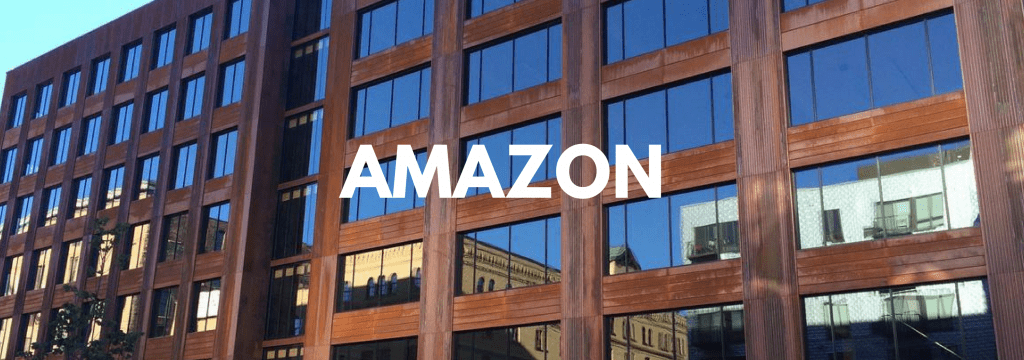
Amazon consistently makes the lists of top employers, both for full-time positions and summer internships, for graduates from universities like the UC Davis Graduate School of Management, SJSU’s Lucas Graduate School of Business, and the Haas School of Business at UC Berkeley.
This likely doesn’t come as a surprise. With an extensive reach into the retail, tech, and entertainment industries, Amazon has made headlines in the past years for its vigorous hiring of MBA students and graduates. In 2015, the company was the number one employer for graduating MBA students, and it doesn’t look like that trend will change any time soon.
Amazon has hired more Haas MBAs for employment and internships than any one company has in recent history (33 in 2017). There are also currently 165 Haas alumni already working at the company, who continue to play a large role in the recruitment and onboarding process for new hires.
One reason that might explain the staggering number of Haas MBAs joining Amazon is the company’s vigorous recruitment process, which begins early in fall and provides practice for case interviews. According to MBA alum Carolyn Chuong, now a Senior Product Manager at Amazon, the Amazon corporate culture and Berkeley’s academic philosophy are a good fit for each other.
“Haas and Amazon have cultures that value feedback,” she said.
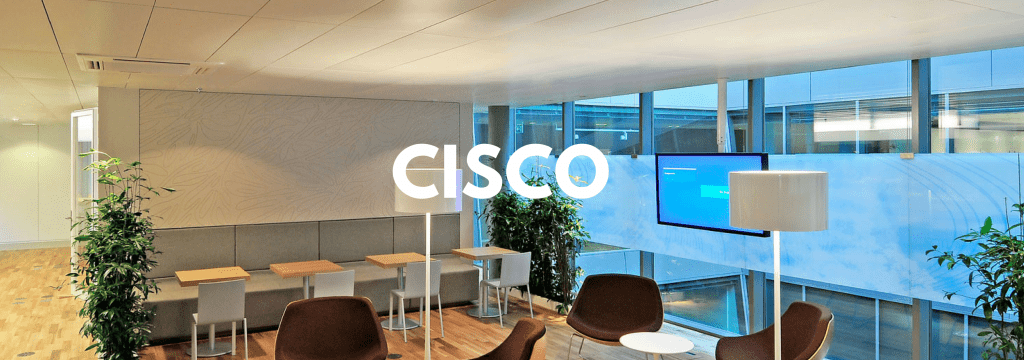
San Francisco’s role today as a hub for technology may help explain why Cisco Systems, an American multinational technology company headquartered in San Jose, is one of the top internship destinations for MBA students at schools like Haas, SJSU, and the University of San Francisco School of Management.
For students both in and out of the tech fields, Cisco offers internship opportunities in fields like marketing, security, supply chain, operations, human resources, and more. Schools like the San Jose State University even offers special opportunities through their corporate partnership with Cisco, such as a unique MS Software Engineering, specialization in cybersecurity available only for employees.

Listed in 2017 as the most visited website in the world, Google seems to have no limits to how far the company might grow. Headquartered in Mountain View, California, Google now employs more than 85,050 people around the globe. Talented MBAs who can break into the company can make, on average, nearly $6,000 per month as an intern, not to mention attractive benefits like free food, gym membership and transportation. Simply put, a stop at Google is one of the most attractive Bay Area internships out there.
Not surprisingly, Stanford University Graduate School of Business and Berkeley Haas have the most alumni currently with Google. San Jose State University and UC Davis grads are also prolific at the company, among other top schools like Cornell, Harvard, and MIT. Landing an internship at Google can be an incredibly challenging process. With high rates of alumni from California schools working at the company, students can leverage their university’s professional network to make connections and get their foot in the door.

Tesla, a multinational corporation specializing in renewable energy, offers a large number of internships and co-ops for MBA students. With its headquarters in Palo Alto, CA, and a commitment to taking on some of the world’s most important problems, it’s understandable why students at schools like USFCA, UC Davis, and SJSU seek out internship opportunities with the company.
“My experiences as a Tesla intern are some that I will take with me for the rest of my career,” one Tesla intern said on her experience. “I had the opportunity to tackle problems that were challenging, unique, and relevant—and within several weeks, I was trained to weigh in on decisions that would affect an entire production line.”
According to Tesla, interns and co-ops will be matched with teams and projects based on their background and career goals. Many Tesla interns have returned to the company in a full-time role after graduation.
The California MBA Program Guide

If you’re looking to earn a California MBA, where should you go to school? Should you choose a top MBA program in Los Angeles or San Francisco? Both cities offer beautiful weather, gorgeous beaches, and world-class business education, but is one location better than the other?
Los Angeles vs. San Francisco
To get started, it’s necessary to compare the cost of living in Los Angeles and San Francisco. According to Numbeo, the world’s largest database containing user contributed data about cities, San Francisco is far and away the more expensive place to live. You would need $7,748.24 in San Francisco, CA to afford the same lifestyle that you can have for $5,700 in Los Angeles. That’s just over $2,000 more per month needed to live in San Francisco, and here’s how that’s broken down.
- Consumer Prices:98 percent higher in San Francisco
- Rent Prices: 51 percent higher in San Francisco
- Restaurant Prices: 62 percent higher in San Francisco
- Groceries Cost: 8 percent higher in San Francisco
- Local Purchasing Power: 77 percent higher in San Francisco
Right off the bat, it’s obvious that the cost of rent (real estate) is what will eat up most of your paycheck in San Francisco, but is that offset by anything? Here are the other things to consider when choosing between San Francisco and Los Angeles.
- Industries
- Los Angeles is ranked top in the country for manufacturing with over 500,000 workers in the industry. Other top industries include banking and finance (more than 100 foreign and domestic banks), entertainment, and tourism.
- San Francisco, on the other hand, is known as Silicon Valley (with San Jose) for its technology companies and startups (Intel, Apple, Genentech, Google, Uber, and Twitter). It’s also a great city for finance, global business, medical science, biotechnology, tourism, and fashion apparel (home of the Levi Strauss & Co headquarters).
- Economic Development: According to the Center for Jobs, San Francisco far and away outperforms Los Angeles in terms of economic growth and development with the Bay Area growing year-over-year while LA has struggled with almost consistent decreases.

- Top Companies: California is home to 53 Fortune 500 companies, second only to NYC. And more of those companies are located in the Bay Area compared to Los Angeles. San Francisco is home to Apple (3), McKesson (5), Chevron (19), and Wells Fargo (25). While Los Angeles is home to Aecom (161), CBRE (214), and Reliance Steel & Aluminum Co (320).
Los Angeles vs San Francisco MBA Programs
The next step is to compare the top three MBA programs in each city. In particular, we wanted to take a look at the tuition rates (two years), GMAT averages, and post-graduation salaries at each program in each city to get a well-rounded picture.
There are a few things to note right away.
- San Francisco is home to more highly ranked MBA programs with two ranking in the top ten on every list. However, it’s important to note that both cities have programs that rank well and are considered top tier schools.
- The average tuition in each city is fairly even. However, the most expensive ($137,00) and the most affordable ($77,000) schools are located in San Francisco, whereas Los Angeles is more even regarding tuition across the board.
- You’ll need a better GMAT score to go to a school in San Francisco, and that GMAT score translates into a higher salary after graduation. San Francisco graduates earn about $11,000 more per year compared to their LA counterparts.
Here’s how it all breaks down per school.
Top 3 Los Angeles MBA Programs
Anderson School of Management – UCLA
The UCLA Anderson School of Management offers a full-time MBA, a part-time MBA, an Executive MBA, and a UCLA-NUS Global MBA (Asia Pacific) program. It’s considered one of the top business schools in the world, ranking 6th in the Economist, 15th in Forbes, 16th in the U.S. News & World Report, and 25th in Financial Times.
- Tuition Rates (two years): $117,176
- GMAT Averages: 719
- Post-Grad Salaries (Mean): $119,964
Marshall School of Business – USC
The Marshall School of Business at USC offers a full-time MBA program, a part-time MBA, an Executive MBA, and IBEAR (International Business Education and Research) MBA, and an Online MBA program. The school’s full-time MBA program is ranked: 20th in the U.S. News & World Report, 33rd in Forbes, 59th in Financial Times, and 65th in the Economist.
- Tuition Rates (two years): $116,361
- GMAT Averages: 703
- Post-Grad Salaries (Mean): $115,309
The Paul Merage School of Business – University of California, Irvine
The Paul Merage School of Business has both a full-time MBA program as well as a part-time fully-employed MBA program. In addition, the school offers an Executive MBA and a Health Care Executive MBA program. The business school is ranked highly across multiple rankings including 41st in Forbes, 42nd in the U.S. News & World Report, 56th in the Economist, 64th in Financial Times.
- Tuition Rates (two years): $87,661
- GMAT Averages: 652
- Post-Grad Salaries (Mean): $97,808
Top 3 San Francisco MBA Programs
Haas School of Business – UC Berkeley
The Haas School of Business offers a full-time MBA, part-time MBA, and Executive MBA program. Haas is ranked as one of the top business school’s in the world ranking in the top ten on every list: 7th overall in U.S. News & World Report and 7th overall in the Economist, as well as 9th overall in Forbes, and 10th overall in the Financial Times.
- Tuition Rates (two years): $117,444
- GMAT Averages: 725
- Post-Grad Salaries (Mean): $125,573
Stanford University Graduate School of Business
The Stanford University Graduate School of Business offers only a full-time MBA program, but it’s one of, if not the top two-year program in the world. When looking at how Stanford GSB stacks up to the competition, the rankings speak for themselves with all in the top ten and most in the top five, including: 1st overall in the Financial Times, 2nd overall in Forbes, 4th in the U.S. News & World Report, and 9th in the Economist.
- Tuition Rates (two years): $137,736
- GMAT Averages: 733
- Post-Grad Salaries (Mean): $144,455
UC Davis Graduate School of Management
At the UC Davis Graduate School of Management, MBA applicants can apply to the full-time MBA or the part-time MBA program. Once again, UC Davis is one of the top schools in the world, ranking 37th in the U.S. News & World Report, 63rd in Forbes, and 67th in the Economist.
- Tuition Rates (two years): $77,698
- GMAT Averages: 669
- Post-Grad Salaries (Mean): $97,695
California MBA Breakdown in Charts
When breaking down the data between MBA programs in Los Angeles and San Francisco, here’s what it looks like
California MBA Tuition (Los Angeles vs. San Francisco)
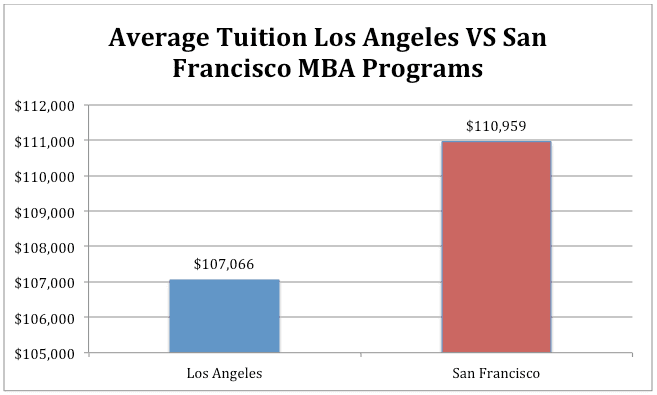
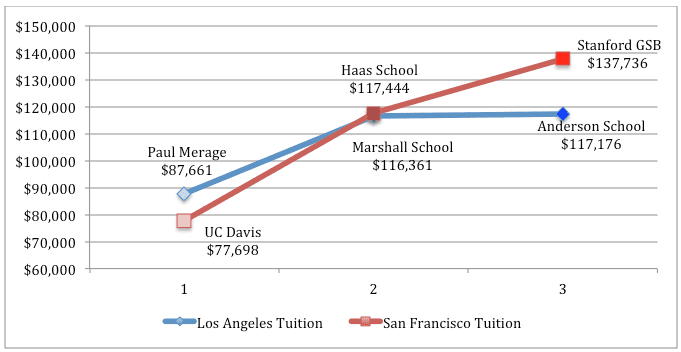
California MBA GMAT Averages
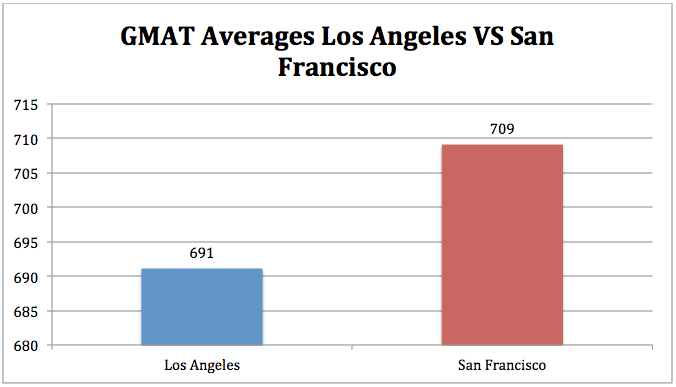
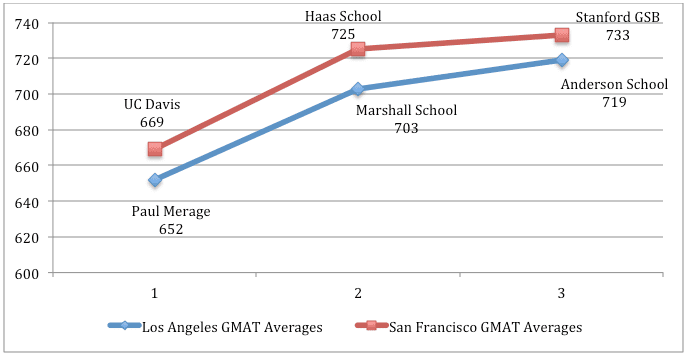
California MBA Post-Graduation Salaries
